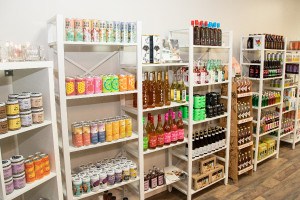The Worst Nutrition “Advice” Real Nutritionists Have Seen on Instagram
In a world of wellness influencers, not all the health advice is legit.

Photograph by Igor Miske on Unsplash
When it comes to healthy eating, everyone has an opinion on what’s good, what’s bad, what’ll make you gain weight, and what’ll make you lose it. But every body is different — and just because a diet of all-corn worked for someone, that doesn’t mean it’ll work for you (and, um, we don’t recommend trying it.) That’s why we like to leave nutrition advice to the pros: dietitians and nutritionists who are always up on the latest in healthy-eating research.
That said, thanks to a little thing called social media, everyone has a platform these days to share nutrition tips — whether or not they have the degree and the research to back up their claims. To help us identify some of the worst nutrition “advice” out there, we asked our panel of Philly nutritionists to call out the biggest myths they’ve seen on Instagram and around the internet.
Weight-Loss Teas
“These are EVERYWHERE! They claim to ‘detoxify’ your body, help you shed major pounds, and boost your metabolism. Most of these teas are simply loaded with laxatives and caffeine, and the people who claim to use them often post misleading photos. If a detox is what you’re after, rest assured as your liver is already responsible for detoxifying your body. There is no magic solution to weight loss; adding a tea to your day certainly isn’t the answer. Focus on the big picture — aim to get a balanced intake across all food groups!” — Kaitlin Sherman of OnPoint Nutrition
“Detox” Cleanses
“We tend to see a lot of wellness bloggers talking about cleanses or detoxes, specifically ‘nutritional cleansing.’ Unfortunately, you’ll see people spend money on supplements or programs that ensure you’ll lose weight and rid your body of toxins. Our bodies are well equipped at cleansing itself via the kidneys and liver. These organs naturally ‘detox’ your body without needing assistance (unless of course you have a medical condition, like chronic kidney disease). The best advice for people who feel like they have over indulged or need to do a ‘cleanse,’ is to consume adequate amounts of vegetables, lean protein, whole grains and water while limiting processed foods that are high in sugar, salt and fat.” — Liz Smith of Two Hungry Work Wives
Bulletproof Coffee
“Bulletproof coffee made with butter and coconut oil contains high levels of potentially harmful fats (the research is not there to support all the claims for coconut oil, and butter is probably not good for you), but regardless of that, some people are consuming 400 calories of that thinking it is healthy, without getting any protein, fiber, or beneficial nutrients. It is a recipe for weight gain.” — Kelly Strogen, Wayne Nutrition (who’s not on Instagram but has seen this trend online)
Intermittent Fasting
“One thing that I see everywhere, and wish would stop, is intermittent fasting. Not only does IF increase your odds of rebound overeating, it can also interrupt your sleep (probably because you’re hungry and thinking about food) and decrease your muscle mass. The bottom line here is: If it doesn’t FEEL right (i.e., you don’t feel good doing it) then it probably isn’t. Instead of focusing so much on hours in the day and what NOT to do, I feel it’s better to focus on what we CAN do. Focusing on what you can’t do ultimately leads to residual weight gain — the opposite of the intended goal.” — Katelan Glutz of OnPoint Nutrition
The Keto Diet
“One of the biggest trends that I have needed to address with my clients most recently is the Keto diet. There are tons of bloggers and Instagram ‘famous’ individuals that are supporting this diet fad, which I simply CANNOT get behind! It is far way too restrictive and does not support the foundation of what a healthy diet is or should be considered as. A healthy diet incorporates a wide variety of foods that are good for us. Very simply, a ‘diet’ should be a sustainable way of eating and the Keto diet, in my opinion does not support either of those previous statements.” —Theresa Shank of Philly Dietitian
“Healthy” Desserts
“The advice to bake various vegan desserts is one I try talking about with my clients who are curious about veganism. The various vegan desserts are all over the place right now, and sure, it’s great to replace a Snickers bar with a more nutritious option, but with dates, almond flour, coconut oil, honey, coconut sugar, etc., those baked goods are still going to be very high in sugar and calories. I’ve seen many clients not being able to reach their weight loss and health goals when adding too many of these types of foods. Portion size is important as well. A large and luscious dessert may look great in a picture, but I’m guessing that many of the Instagrammers actually eat smaller portions of what they photograph.” — Amy von Sydow Green, RD
Reishi Mushrooms
“Reishi mushrooms are believed to prevent tumor growth, detox the liver, fight diabetes, and prevent infection/viruses. This is not evidenced-based, and I disagree when I see this being promoted. If there was such a magic pill, the healthcare world would be bottling it up. This goes back to eating in moderation to get a variety of nutrients, which help protect our body from disease. There is no need to add Reishi mushrooms to coffee, tea, or any food for that matter.” — Melissa Bailey of Two Hungry Work Wives
Gluten = Evil
“Whenever I see posts about gluten on social media, there always seems to be a bad connotation surrounding it. Actually, avoiding gluten can cause more harm than good. Usually when people avoid gluten they typically substitute with foods that are more processed and full of artificial ingredients. Most people consume gluten from breads, cakes, cookies, etc. Choosing the gluten-free option of these foods still contain sugar, fat, and are usually HIGHER in calories. A gluten-free diet is most helpful to those who are diagnosed with Celiac disease. At the end of the day, a gluten-free cookie is still a cookie!” — Zoe Fienman of OnPoint Nutrition
Superfoods
“Something that drives me crazy is when wellness/health bloggers give more merit to certain foods as ‘good foods’ or ‘superfoods’ than those foods have earned (examples: cold pressed juice, coconut water, avocado, anything coconut, dried fruit, dates, açaí bowls, kombucha, etc.). Unfortunately, a lot of people use Instagram just for pretty pictures and are frequently looking for quick answers, so the posting of pretty ‘healthy’ pictures without a lot of content probably isn’t going anywhere.” — Sheena Pradhan of Nutritious Balance
Crash Diet Supplements
“These products prey on people who want to lose weight and promise a quick fix that will only discourage them, and possibly even damage their metabolism. The big take away is: If something seems too good to be true, or way too easy, don’t fall for it! Living your healthiest life involves hard work and effort — there’s no way around it.” — Emily Pierce of OnPoint Nutrition
Like what you’re reading? Stay in touch with Be Well Philly—here’s how:
- Like Be Well Philly on Facebook
- Follow Be Well Philly on Instagram
- Get the Be Well Philly Newsletter
- Follow Be Well Philly on Twitter


